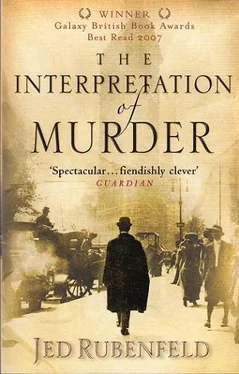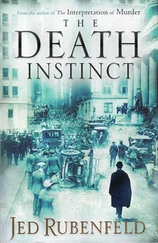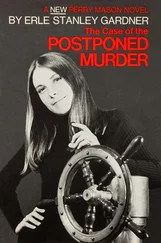Jed Rubenfeld - The Interpretation of Murder
Здесь есть возможность читать онлайн «Jed Rubenfeld - The Interpretation of Murder» весь текст электронной книги совершенно бесплатно (целиком полную версию без сокращений). В некоторых случаях можно слушать аудио, скачать через торрент в формате fb2 и присутствует краткое содержание. Жанр: Исторические приключения, на английском языке. Описание произведения, (предисловие) а так же отзывы посетителей доступны на портале библиотеки ЛибКат.
- Название:The Interpretation of Murder
- Автор:
- Жанр:
- Год:неизвестен
- ISBN:нет данных
- Рейтинг книги:5 / 5. Голосов: 1
-
Избранное:Добавить в избранное
- Отзывы:
-
Ваша оценка:
- 100
- 1
- 2
- 3
- 4
- 5
The Interpretation of Murder: краткое содержание, описание и аннотация
Предлагаем к чтению аннотацию, описание, краткое содержание или предисловие (зависит от того, что написал сам автор книги «The Interpretation of Murder»). Если вы не нашли необходимую информацию о книге — напишите в комментариях, мы постараемся отыскать её.
The Interpretation of Murder — читать онлайн бесплатно полную книгу (весь текст) целиком
Ниже представлен текст книги, разбитый по страницам. Система сохранения места последней прочитанной страницы, позволяет с удобством читать онлайн бесплатно книгу «The Interpretation of Murder», без необходимости каждый раз заново искать на чём Вы остановились. Поставьте закладку, и сможете в любой момент перейти на страницу, на которой закончили чтение.
Интервал:
Закладка:
'I am overjoyed, Abraham,' said Freud, returning the manuscript. 'Really I am. But you were telling us about Jung.'
Brill's face fell. He rose from his seat, lifted his chin, and declared haughtily, 'So that is how you treat my life's work of the last twelve months. Some dreams do not require interpretation; they require action. Good-bye.'
Then he sat down again.
'Sorry, don't know what came over me,' he said. 'Thought
I was Jung for a moment.' Brill's rendition of Jung — which had been remarkable — put Ferenczi in stitches but left Freud unmoved. Clearing his throat, Brill directed our attention to the name of his publisher, Smith Ely Jelliffe, on the manuscript's tide page. 'Jelliffe runs the Journal of Nervous Disease,' said Brill. 'He's a doctor, rich as Croesus, very well connected, and another convert to the cause, thanks to me. By God, I will make this Gomorrah a very Eden for psychoanalysis; you'll see. Anyway, our friend Jung had a secret rendezvous with Jelliffe on Sunday night.'
It turned out that Jelliffe, when Brill picked up the manuscript from him this morning, had mentioned having Jung to dinner at his apartment on Sunday night. Jung had told us nothing about such a meeting. 'Apparently their chief topic of conversation was the location of Manhattan's best brothels, but listen to this,' Brill continued. 'Jelliffe has asked Jung to give a series of lectures on psychoanalysis next week at Fordham University, the Jesuit school.'
'But that is excellent news!' Freud exclaimed.
'Is it?' asked Brill. 'Why Jung, rather than you?'
'Abraham, I am giving a lecture every day in Massachusetts beginning Tuesday of next week. I couldn't possibly lecture in New York at the same rime.'
'But why the secrecy? Why conceal his meeting with Jelliffe?'
To this question, none of us had an answer. Freud, however, was unconcerned, commenting that there was undoubtedly a good reason for Jung's reticence.
All this time, I had been holding Brill's thick manuscript. Having read the first couple of pages, I turned to the next and was surprised by the sight of an almost completely blank sheet. On it were only five lines of print: centered, italicized, capitalized. It was a biblical verse of some kind.
'What's this?' I asked, displaying the page.
Ferenczi took the page from my hand and read as follows:
Take away the foreskins of your heart, ye men of Jerusalem: lest my fury come forth like fire, and burn that none can quench it, because of the evil of your doings.
'Jeremiah, no?' Ferenczi added, demonstrating a knowledge of scripture considerably superior to my own. 'What is Jeremiah doing in your hysteria book?'
Odder still, at the bottom of the page — which Ferenczi now placed in the center of our table — was the ink- stamped image of a face. It was a wizened Oriental sage of some kind, with a turban on his head, a long nose, a longer beard, and wide-open, mesmerizing eyes.
'A Hindoo?' asked Ferenczi.
'Or an Arab?' I suggested.
Oddest of all, the next page of the manuscript was just the same — blank but for the biblical passage in the center — although there was no wide-eyed, turbaned face stamped on it. I riffled through the remaining pages. All were the same, minus the face.
'Is this a joke, Brill?' said Freud.
Judging by the look on Brill's face, it was not.
Detective Littlemore was sorely disappointed by the coroner's dismissal of his discoveries, but he allowed Hugel to change the subject back to Miss Riverford's maid, who had also provided interesting information.
'She's real bad off, Mr Hugel; I wish I could do something for her,' said the detective. In fact, he had: finding Betty reluctant to speak with him at first, Littlemore had taken her to a soda fountain. When he told her he knew she had been let go, she burst out about how unfair it was. Why had they fired her? She hadn't done anything. Some of the other girls stole from the apartments — why didn't they fire one of them? And what would she do now? It turned out that Betty's father had passed away the year before. For the last two months, Betty had been supporting her whole family — her mother and three little brothers — with her wages from the Balmoral.
'What did she tell you, Detective?' asked the coroner, biting his lip.
'Betty says she didn't like going into Miss Riverford's apartment. She said it was haunted. Twice she was sure she heard a baby crying, but there wasn't any baby; the apartment would be empty. She says Miss Riverford was strange. Just shows up one day about four weeks ago. No moving trucks; no nothing. The apartment was furnished before she got there. Real quiet type, very private. Never any mess. Always made her own bed and kept her things just so — one of her closets was always locked. She tried to give Betty a pair of earrings once. Betty asked were they real — real diamonds, that is — and when Miss Riverford said yes, Betty wouldn't take them. But Betty almost never saw her. Betty worked nights for a while, and she saw Miss Riverford a couple of times then. Otherwise she was always up and out of the apartment before seven, when Betty got there. One of the doormen told me Miss Riverford left the building a couple of times before six. What's that mean, Mr Hugel?'
'It means,' answered the coroner, 'you are going to send a man to Chicago.'
'To talk to the family?'
'Correct. What did the maid tell you about the bedroom when she first discovered the body?'
'The thing is, Betty doesn't remember that part too well. All she can remember is Miss Riverford's face.'
'Did she see anything near the dead girl or lying on top of her?'
'I asked her, Mr Hugel. She can't remember.'
'Nothing?'
'She just remembers Miss Riverford's eyes, open and staring.'
'Weak little idiot.'
'You wouldn't say that if you talked to her,' he said. Littlemore was taken aback. 'How do you figure something changing anyway?'
'What?'
'You're saying something in the room changed from when Betty first went in to when you got there. But I thought they locked the apartment right away and put that butler guy in the hall to keep everybody out until you got there.'
'I thought so too,' the coroner replied, pacing the short length of his cramped office. 'That's what we were told.'
'So why do you think someone got in the room?'
'Why?' repeated Hugel, scowling. 'You want to know why? Very well, Mr Littlemore. Follow me.'
The coroner strode out the door. The detective followed him — down three flights of old stairs and through a maze of peeling corridors, eventually emerging in the morgue. The coroner unlocked a vaulted door. When he opened it, Littlemore felt the blast of stale, freezing air, then saw rows of cadavers on wooden shelves, some naked and stretched out for all to see, others covered by sheets. He could not help looking at their privates, which repulsed him.
'No one else,' announced the coroner, 'would have examined her body closely enough to see this clue. No one.' He strode to the back of the chamber where a body lay on the farthest shelf. A white sheet covered it, on which was written Riverford, E.: 29.8.09. 'Now look at her carefully, Detective, and tell me exactly what you see.'
The coroner threw back the sheet with a flourish. Littlemore's eyes went wide, but Hugel looked even more astonished than the dectective. Beneath the sheet lay not Elizabeth Riverford's corpse, but that of a. black-toothed, slack-skinned old man.
I took the elevator to Miss Acton's floor — and then remembered that I had to go back to my own first, to get paper and pens. The bizarre biblical passage in his manuscript had affected Brill deeply. He seemed actually frightened. He said he was going straight back to Jelliffe, his publisher, for an explanation; I felt there might be something he wasn't telling us.
Читать дальшеИнтервал:
Закладка:
Похожие книги на «The Interpretation of Murder»
Представляем Вашему вниманию похожие книги на «The Interpretation of Murder» списком для выбора. Мы отобрали схожую по названию и смыслу литературу в надежде предоставить читателям больше вариантов отыскать новые, интересные, ещё непрочитанные произведения.
Обсуждение, отзывы о книге «The Interpretation of Murder» и просто собственные мнения читателей. Оставьте ваши комментарии, напишите, что Вы думаете о произведении, его смысле или главных героях. Укажите что конкретно понравилось, а что нет, и почему Вы так считаете.












